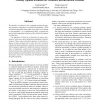Free Online Productivity Tools
i2Speak
i2Symbol
i2OCR
iTex2Img
iWeb2Print
iWeb2Shot
i2Type
iPdf2Split
iPdf2Merge
i2Bopomofo
i2Arabic
i2Style
i2Image
i2PDF
iLatex2Rtf
Sci2ools
140
click to vote
ICCV
2005
IEEE
2005
IEEE
Globally Optimal Estimates for Geometric Reconstruction Problems
We introduce a framework for computing statistically optimal estimates of geometric reconstruction problems. While traditional algorithms often suffer from either local minima or non-optimality - or a combination of both - we pursue the goal of achieving global solutions of the statistically optimal cost-function. Our approach is based on a hierarchy of convex relaxations to solve non-convex optimization problems with polynomials. These convex relaxations generate a monotone sequence of lower bounds and we show how one can detect whether the global optimum is attained at a given relaxation. The technique is applied to a number of classical vision problems: triangulation, camera pose, homography estimation and last, but not least, epipolar geometry estimation. Experimental validation on both synthetic and real data is provided. In practice, only a few relaxations are needed for attaining the global optimum.
Classical Vision Problems | Computer Vision | Convex Relaxations | Geometric Reconstruction Problems | Global Optimum | ICCV 2005 | Non-convex Optimization Problems |
Related Content
| Added | 15 Oct 2009 |
| Updated | 15 Oct 2009 |
| Type | Conference |
| Year | 2005 |
| Where | ICCV |
| Authors | Fredrik Kahl, Didier Henrion |
Comments (0)

